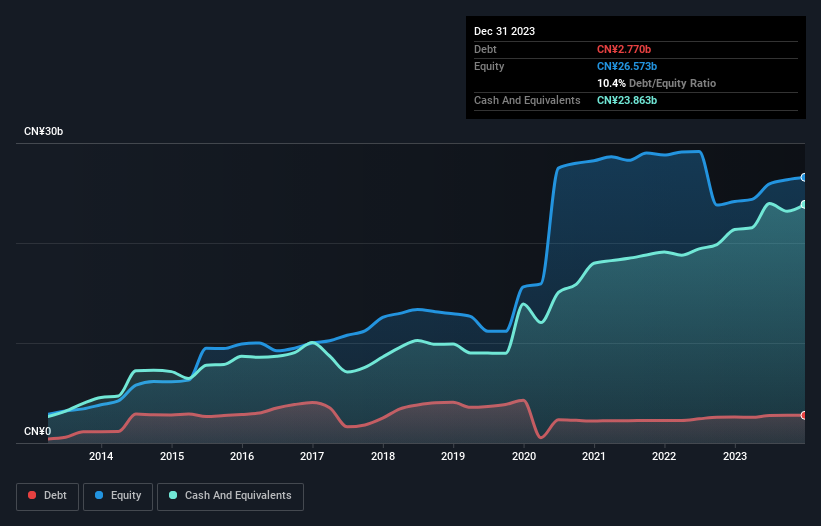
Some say volatility, rather than debt, is the best way to think about risk as an investor, but Warren Buffett famously said that 'Volatility is far from synonymous with risk.' It's only natural to consider a company's balance sheet when you examine how risky it is, since debt is often involved when a business collapses. We note that Kingsoft Corporation Limited (HKG:3888) does have debt on its balance sheet. But should shareholders be worried about its use of debt?
When Is Debt A Problem?
Debt assists a business until the business has trouble paying it off, either with new capital or with free cash flow. If things get really bad, the lenders can take control of the business. However, a more common (but still painful) scenario is that it has to raise new equity capital at a low price, thus permanently diluting shareholders. Of course, debt can be an important tool in businesses, particularly capital heavy businesses. The first step when considering a company's debt levels is to consider its cash and debt together.
Check out our latest analysis for Kingsoft
How Much Debt Does Kingsoft Carry?
The image below, which you can click on for greater detail, shows that at December 2023 Kingsoft had debt of CN¥2.77b, up from CN¥2.59b in one year. However, its balance sheet shows it holds CN¥23.9b in cash, so it actually has CN¥21.1b net cash.

A Look At Kingsoft's Liabilities
We can see from the most recent balance sheet that Kingsoft had liabilities of CN¥4.88b falling due within a year, and liabilities of CN¥3.74b due beyond that. Offsetting these obligations, it had cash of CN¥23.9b as well as receivables valued at CN¥785.2m due within 12 months. So it actually has CN¥16.0b more liquid assets than total liabilities.
This excess liquidity is a great indication that Kingsoft's balance sheet is almost as strong as Fort Knox. With this in mind one could posit that its balance sheet means the company is able to handle some adversity. Simply put, the fact that Kingsoft has more cash than debt is arguably a good indication that it can manage its debt safely.
On top of that, Kingsoft grew its EBIT by 51% over the last twelve months, and that growth will make it easier to handle its debt. When analysing debt levels, the balance sheet is the obvious place to start. But ultimately the future profitability of the business will decide if Kingsoft can strengthen its balance sheet over time. So if you're focused on the future you can check out this free report showing analyst profit forecasts.
Finally, a company can only pay off debt with cold hard cash, not accounting profits. Kingsoft may have net cash on the balance sheet, but it is still interesting to look at how well the business converts its earnings before interest and tax (EBIT) to free cash flow, because that will influence both its need for, and its capacity to manage debt. Happily for any shareholders, Kingsoft actually produced more free cash flow than EBIT over the last three years. That sort of strong cash conversion gets us as excited as the crowd when the beat drops at a Daft Punk concert.
Summing Up
While we empathize with investors who find debt concerning, you should keep in mind that Kingsoft has net cash of CN¥21.1b, as well as more liquid assets than liabilities. And it impressed us with free cash flow of CN¥3.0b, being 150% of its EBIT. The bottom line is that Kingsoft's use of debt is absolutely fine. Another factor that would give us confidence in Kingsoft would be if insiders have been buying shares: if you're conscious of that signal too, you can find out instantly by clicking this link.
At the end of the day, it's often better to focus on companies that are free from net debt. You can access our special list of such companies (all with a track record of profit growth). It's free.
If you're looking to trade Kingsoft, open an account with the lowest-cost platform trusted by professionals, Interactive Brokers.
With clients in over 200 countries and territories, and access to 160 markets, IBKR lets you trade stocks, options, futures, forex, bonds and funds from a single integrated account.
Enjoy no hidden fees, no account minimums, and FX conversion rates as low as 0.03%, far better than what most brokers offer.
Sponsored ContentValuation is complex, but we're here to simplify it.
Discover if Kingsoft might be undervalued or overvalued with our detailed analysis, featuring fair value estimates, potential risks, dividends, insider trades, and its financial condition.
Access Free AnalysisHave feedback on this article? Concerned about the content? Get in touch with us directly. Alternatively, email editorial-team (at) simplywallst.com.
This article by Simply Wall St is general in nature. We provide commentary based on historical data and analyst forecasts only using an unbiased methodology and our articles are not intended to be financial advice. It does not constitute a recommendation to buy or sell any stock, and does not take account of your objectives, or your financial situation. We aim to bring you long-term focused analysis driven by fundamental data. Note that our analysis may not factor in the latest price-sensitive company announcements or qualitative material. Simply Wall St has no position in any stocks mentioned.
About SEHK:3888
Kingsoft
Engages in the entertainment and office software and services businesses in Mainland China, Hong Kong, and internationally.
Flawless balance sheet with solid track record.


